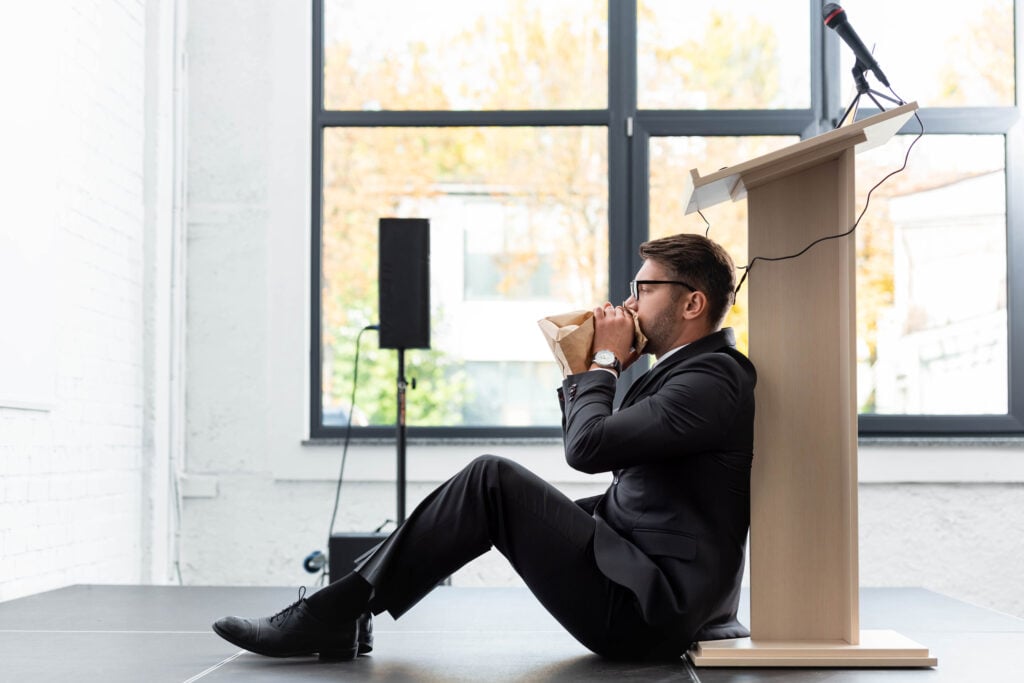Anyone who performs or presents in front of an audience is probably acquainted with the anxiety that often accompanies this situation. Commonly referred to as “stage fright,” this anxiety can make it challenging to feel comfortable in front of an audience. The more you are in the spotlight, the more comfortable you will become. But when you’re first starting out, it may help to employ a few tips and tricks to help you relax when all eyes are on you.
What Is Stage Fright?

Stage fright is the type of anxiety that people feel when they are performing or presenting in front of other people. In these situations, your body and brain may react to make you actually feel like you are in danger when you are in front of other people. The typical human response is either to fight or run away from anything that might cause harm. Even when a physical threat doesn’t exist, it’s still normal for the body to want to freeze, fight, or flee in response to being in the spotlight.
Symptoms of Stage Fright

Stage fright symptoms might not happen until immediately prior to a performance, or you might start feeling anxiety in the days and weeks leading up to a performance. Typical symptoms include tenseness, fidgeting, shaky hands, a quavering voice, and feeling lightheaded. You might also start perspiring, and your heart will probably beat faster when you think about performing. Some people also feel gastrointestinal upset such as stomach pain and nausea. Additional symptoms can include a dry mouth, throat tightness, excessive dread and worry, paranoia about rejection and judgment, and an overwhelming desire to run away.
Tips for Overcoming Stage Fright
Acknowledging feelings of stage fright is the first step toward managing these uncomfortable feelings. It may also help to remember that you are not alone and that many people experience similar feelings when they have to present or perform in front of an audience.
Instead of focusing on your fears and discomforts, try to think about the purpose of your performance and about what you will be contributing to help or entertain others. Don’t focus on conjuring up the worst-case scenarios about what will happen if you make a mistake; these thoughts reduce your confidence and make you doubt yourself.

Use meditation exercises to center yourself, focusing on deep breathing and relaxation. Think positive thoughts centered around visualizing your successful performance or presentation and your ability to handle any stressful situation that might occur. Choose a message to repeat to yourself over and over that focuses on how successful your performance is going to be.
Before speaking or performing in public, spend plenty of time preparing. Practice in front of a mirror until you’re comfortable with your delivery. If possible, rehearse on stage so you can walk through where you’ll be and what the environment will be like.
Make sure to take care of yourself physically prior to your performance by exercising, eating healthy foods, limiting caffeine intake, and getting enough sleep.

When you’re on stage, stand or sit with good posture. Think of the audience as your friends, smile naturally, and make eye contact with people from time to time as you speak.
Take care not to rush through your performance, and don’t try to make it perfect. Remember that it’s OK to be human and make mistakes. Just try to be as natural possible. In time, as you get more experience on stage, you may even find that you enjoy being in the spotlight.
- Conquering Stage Fright
- Stage Fright: What it Is, Causes, and How to Overcome It
- Stage Fright: How to Overcome it in Seven Easy Steps
- Ten Tips to Overcome Stage Fright
- How to Overcome Stage Fear
- Theater Performance Anxiety
- Ten Fast and Effective Ways to Overcome Stage Fright
- 13 Tips to Overcome Stage Fright
- Seven Tips for Overcoming Stage Fright
- Tip Jar: Top Nine Tricks to Overcome Stage Fright
- Ten Tips for Overcoming Stage Fright
- How to Get Comfortable With Giving Presentations
- Six Tips for Performing Without Fear
- How to Overcome Stage Fright
- Eight Tips to Overcome Stage Fright
- How to Deal With Stage Fright and Public Speaking Anxiety
- Presentation Skills: Five Tips for Overcoming Stage Fright
- Overcome Stage Fright With a Few Simple Exercises
- Six Tricks for Overcoming Stage Fright

